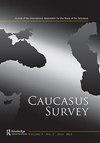Between empire and independence: Armenia and the Transcaucasian Democratic Federative Republic
IF 0.4
Q3 AREA STUDIES
引用次数: 0
Abstract
ABSTRACT The period of the short-lived Transcaucasian Democratic Federative Republic (TDFR) or Transcaucasian Federation was from the Armenian perspective a traumatic one, defined by the military threat coming from the Ottomans and by the complicated relations with the other major ethnic groups of the region. The Armenian political elite and “common Armenians” were caught off-guard by the Russian revolution. The Turkish advance of the Caucasus Front was seen by Armenian political forces as an existential threat, yet this assessment was not necessarily shared by counterparts in the Transcaucasian Federation, especially the Muslim (Azerbaijani) political forces, leading to bitter divisions within the emerging Transcaucasian institutions. These two factors determined the Armenian perspective on the Transcaucasian Federation. The Armenian political entities (first and foremost the Dashnaktsutyun) were opposed to the creation of the Transcaucasian Federation, as they saw its emergence as the result of Ottoman pressure. Yet they were equally reluctant when it came to the transition from the Transcaucasian Federation to independent nation-states. This attitude was reflected in the fact that the Armenian National Council lagged behind its Georgian and Azerbaijani counterparts when it declared itself to be the central body of power in the Armenian-inhabited lands.帝国与独立之间:亚美尼亚与外高加索民主联邦共和国
摘要从亚美尼亚人的角度来看,短命的外高加索民主联邦共和国(TDFR)或外高加索联邦时期是一个创伤时期,其定义是来自奥斯曼人的军事威胁以及与该地区其他主要民族的复杂关系。亚美尼亚政治精英和“普通亚美尼亚人”对俄罗斯革命猝不及防。亚美尼亚政治力量认为土耳其对高加索阵线的推进是一种生存威胁,但外高加索联邦的同行,尤其是穆斯林(阿塞拜疆)政治力量,并不一定认同这一评估,这导致了新兴的外高加索机构内部的激烈分歧。这两个因素决定了亚美尼亚对外高加索联邦的看法。亚美尼亚政治实体(首先是Dashnaktutyun)反对建立外高加索联邦,因为他们认为外高加索联邦的出现是奥斯曼帝国压力的结果。然而,当涉及到从外高加索联邦向独立民族国家的过渡时,他们同样不情愿。这种态度反映在亚美尼亚全国委员会在宣布自己是亚美尼亚人居住的土地上的中央权力机构时落后于格鲁吉亚和阿塞拜疆的同行。
本文章由计算机程序翻译,如有差异,请以英文原文为准。
求助全文
约1分钟内获得全文
求助全文
来源期刊

Caucasus Survey
Arts and Humanities-History
CiteScore
1.30
自引率
9.10%
发文量
4
期刊介绍:
Caucasus Survey is a new peer-reviewed, multidisciplinary and independent journal, concerned with the study of the Caucasus – the independent republics of Armenia, Azerbaijan and Georgia, de facto entities in the area and the North Caucasian republics and regions of the Russian Federation. Also covered are issues relating to the Republic of Kalmykia, Crimea, the Cossacks, Nogays, and Caucasian diasporas. Caucasus Survey aims to advance an area studies tradition in the humanities and social sciences about and from the Caucasus, connecting this tradition with core disciplinary concerns in the fields of history, political science, sociology, anthropology, cultural and religious studies, economics, political geography and demography, security, war and peace studies, and social psychology. Research enhancing understanding of the region’s conflicts and relations between the Russian Federation and the Caucasus, internationally and domestically with regard to the North Caucasus, features high in our concerns.
 求助内容:
求助内容: 应助结果提醒方式:
应助结果提醒方式:


